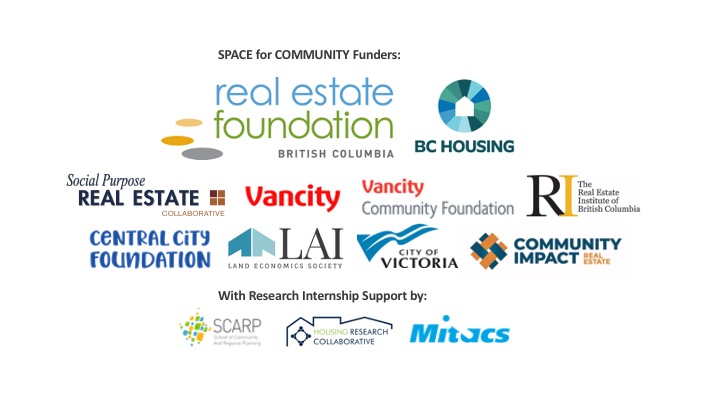
“Issues of affordability, suitability, and security of tenure are placing communities under pressure, displacing vital organizations, programs and services.”
With over 25,000 not-for-profit organizations and thousands of social enterprises, each delivering critical programs and services touching the lives of most citizens, the health of these organizations is fundamental to the health of our Province. Over the decades, changes in BC's real estate market--from Vancouver to Squamish, adjacent municipalities, Victoria and parts of the Island--have created extreme challenges not only for housing, but for space for non-profits, social enterprises, artists and community owned assets.
SPRE and our partner the Real Estate Insitute of BC (REIBC), are proud to release the 2021 FINAL REPORT for Space for Community: Understanding the Real Estate Challenges Affecting the Social Purpose Sector in BC. Space for Community (S4C) seeks to further understand the challenges facing such organizations within the context of the commercial real estate market, and to build capacity within these sectors and beyond. Policies that preserve space for community are needed. Space For Community knits together research with up to-date data, and strategies for action.
access the S4C Final report Click HerE
access the S4C Infographic click here
watch the recordings of our webinar series HERE
SPACE FOR COMMUNITY Study Components:
- Space for Community Final Report, April 2021
- Space for Community Infographic, April 2021
- Land Use through the Lens of Equity, Inclusion, Reconcillation Annotated Bibliography, March 2021
- Space for Community Research Report, October 2020
- Space for Community Survey Questions, October 2020
- Space for Community Literature Review & Annotated Bibliography, 2020
- Financial Aspects of Renting, Leasing, Licensing Space 2019 - 2020. Seven workshops in Vancouver, Richmond, Surrey, City of North Vancouver, Victoria and Nanimo. Lead by Martha Burton, social purpose real estate and leasing expert.
2013 RENT - LEASE OWN:
- RENT - LEASE - OWN: Undertstanding the Real Estate Challenges Affecting the Not-for-Profit, Cultural and Social Purpose Sectors in Metro Vancouver, 2013
"2020 SPACE FOR COMMUNITY is generously supported by members of the Social Purpose Real Estate Collabortive with project funding from the Real Estate Foundation of BC, BC Housing, Vancity Community Foundation & Vancity Credit Union, the Real Estate Institute of BC, the Community Impact Real Estate Society, the Land Economics Society – Vancouver Chapter, Central City Foundation and the City of Victoria. Additional support from the UBC School of Community & Regional Planning, Housing Research Collaborative and Mitacs was provided for the SPRE Research Internship"
